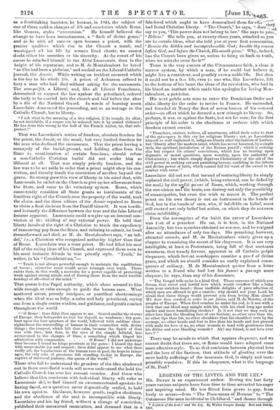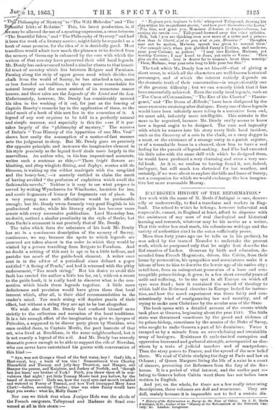LEGENDS OF THE LINTEL AND THE LEY.* Ma. DENDY is
an experienced author. During the last forty years various subjects have from time to time attracted his eager and inquiring mind. He lies flitted from grave to gay, from lively to severe—from " The Phenomena of Dreams" to " The Cutaneous Diseases incidental to Childhood," and thence through
• Legends of the Lattcl and the Ley. By Walter Cooper Dandy. BeU and Daldy, 1803.
Th 13
Philosophy of Mystery" to "The Wild Hebrides" and "The utiful Islets of Britaine." This, his latest production, is, if e may be allowed the use of a. sporting expression, a cross between "The Beautiful Islets," and " The Philosophy of Mystery," and had it been the work of a literary novice, might fairly be regarded as a book of some promise, for the idea of it is decidedly good. Most travellers would admit how much the pleasure to be derived from the scenery of Germany is enhanced by the care with which the writers of that country have preserved their wild local legends. Mr. Dendy has endeavoured to lend a similar charm to that beauti- ful tract of country which lies between Reigate and Farnham. Passing along the strip of upper green sand which divides the chalk from the weald of Surrey, he has attached a tale, more or less founded on tradition, to the spots most remarkable for natural beauty and the more ancient of its numerous manor houses, and these tales are the Legends of the Lintel and the Ley. Unfortunately, however, Mr. Dendy has considerably marred his idea in the working of it out, for just as the bearing of Captain Bunsby's remarks lay in the application of them, so the chief merit of a book of this sort lies in the execution of it. A legend of any sort requires to be told in a perfectly natural and simple manner, and especially is this the case if it par- takes largely of the "philosophy of mystery." The success of Defoe's " True History of the Apparition of one Mrs. Veal" shows how easily the assumption of a matter-of-fact manner sets the judgment to sleep. But Mr. Dendy goes on precisely the opposite principle, and increases the imaginative element in his style precisely as the legend itself deals more largely in the marvellous. An author who, in his less impassioned moments, writes such a sentence as this,—" There bright flowers are blushing, and filmy winglets flitting, and Zephyr, wanton with the blossoms, is waking up the wildest madrigals with the song-bird and the lioney-bee,"—is scarcely entitled to claim the merit of having avoided " the profusion of expletives which swell the fashionable novels." Neither is it easy to see what purpose is served by writing Wynchestre for Winchester, hostelrie for inn, and exotic fragments of history for fragments out of place. In a very young man such affectation would be pardonable enough; but Mr. Dendy wrote formerly very good English in his professional works, while his literary style has become more ornate with every successive publication. Lord Macaulay has, no doubt, noticed a similar peculiarity in the style of Burke, but then Burke's ornament is not precisely that of Mr. Dendy.
The tales which form the substance of his book Mr. Dendy has set in a continuous description of the scenery of Surrey, continuous, we say, because the spots to which legends are annexed are taken almost in the order in which they would be visited by a person travelling from Reigate to Farnham. And no doubt a setting of this sort is apt to be a little tedious, and partake too much of the guide-book element. A writer once sent in to the editor of a periodical since defunct a paper entitled "A String of Pearls," and had it returned with the pithy endorsement, "Too much string." But his desire to avoid this fault has carried the author a little too far, and, without a resort to the guide-book, it is really hard to discover what is the con- nection which binds these legends together. A little more definiteness and precision would have given them that local interest which, after all, is their chief recommendation in the reader's mind. Too much string will deprive pearls of their effect, but without a string they are apt to be lost altogether.
We wish also that Mr. Dandy had confined himself more strictly to the collection and narration of the local traditions. It is a fair enough effort of the imagination to give us, apropos of Polesdon, a supposed to be dinner party given by Sheridan, who once resided there, to Captain Morris, the poet laureate of that set, who lived at Brockham, in the same neighbourhood, but it is not exactly a legend of the sail. And Mr. Dendy has scarcely dramatic power enough to be able to support the role of Sheridan, who can never have entertained his guests with conversation of this kind :- "Aye, was not George a blood of the first water, hey ? Gad's life, a Hart-royal, boy, a buck of ten tine ! Itememberest thou Charley Bloomfield and Tierney, and jolly-boy Thornton, and Hanger, and Stanyer the parson, and Knighton, and Jockey of Norfolk, and, 'though last not least,' our brother of York? Faith, you threw them all in con- vulsions that night ! yet little Tommy Moore beat you hollow, by the beard of Anacreon ! Gads me, how the royal eyes and mouth twinkled and watered at Fanny of Timmol, and how York hiccupped Mary Anne Clark!—halloo, snoozing Charles ; time was when Fanny would have kept you awake : what ho, Molly Deere !"
Nor can we think that when Juniper Hole was the abode of the French emigrants, Talleyrand and Madame de Steel con- versed at all in this strain :—
" Toujours ga;e, tot fours la belle,' whispered Talleyrand, drawing his chin within his magnificent cravat, ' and how port:: themselves the Locks.' Tres bien, and greet you, Monsieur d'Autun or Angustodunum, for
cutting the revolu Talleyrand frowned away the other syllables. Bah, bah ! you are thinking even now more of a mitre and a prince- dom than in liberte; geese ce pea, nest ce pee, Monsieur 7' Thoughts may not be spoken, Madame, speech was given to conceal them: Par example (sic), when you glorified Fanny's Evelina, and made me, your poor Corinne, so jealous.' `I may love Evelina, Madame, yet worship Corinne ; I may kneel to Juno, yet smile on Venus.' 'Thew give are the smile; love is dearer far to woman's heart than worship.'
Then, Madame, wear your robe long to hide your bas " The task which Mr. Deady has set himself—that of giving a short scene, in which all the characters are well-known historical personages, and of which the interest entirely depends on the dramatic truth of their conversation—is unquestionably one of the greatest difficulty ; but we can scarcely think that it has- been successfully achieved. Even the really local legends, such as. "The Curse of Cotmandene," "The Eve of the Charter" "Planta- genet," and "The Doom of .tElfrede," have been disfigured by the same excessive straining after dialogue. Every one of these legends. would have been infinitely more telling in a narrative form and, we must add, infinitely more intelligible. This mistake is the more to be regretted, because Mr. Dendy really seems to know lion- a legend ought to be designed. The care and ingenuity with which he weaves into his story every little local incident,. such as the discovery of a coin in the chalk, or a rusty dagger in a moat, or the existence of a strange entry in a parish register,. or of a remarkable brass in a chancel, show him to have a real feeling for the pursuit of legend-making. And if he had executed his little tales with the same skill with which be designed them, he would have produced a very charming and even a very use- ful book. As it is, we confess to having found it, not, indeed, inelegant, but still much too rhetorical for hot weather, and certainly, if we were about to explore the hills and lanes of Surrey,, not a companion for which we would exchange the less imagina- tive but more reasonable Murray.































 Previous page
Previous page